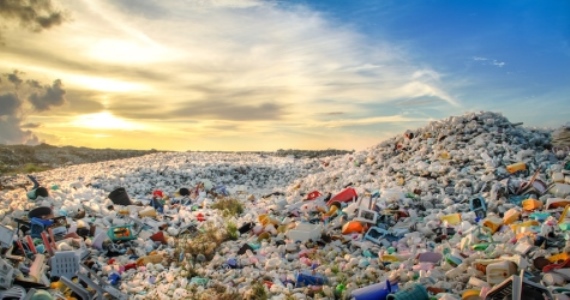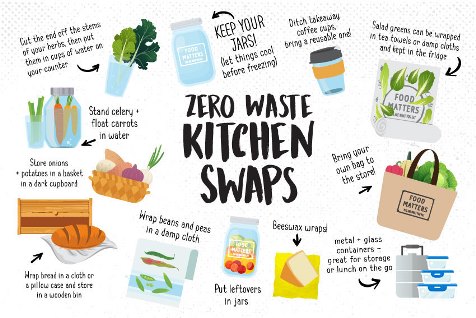By Laurentine Ten Bosch, Food Matters
We live in a world of plastic. Plastic cups, bottles, plates, packaging – our plastic society is putting the world’s ecosystem at risk, but there are some simple steps we can take to change our wasteful habits.
We wrote an article late last year “Are you still using plastic bags?”, and thankfully, many supermarket chains across the world have banned single use plastic bags. Even just recently in Queensland, Australia. This change is a massive step in the right direction for the health of our environment.
Although the popularity of single-use plastic bags is slowly declining, plastic bags and plastic packaging are still being used to package fresh, frozen, and dry foods. One problem has been solved but there’s more to go. Unnecessary plastic is making its way into our homes, and often through the kitchen. So, we’ve looked at a number of ways to reduce, reuse, and recycle in the kitchen.

What does our waste look like?
Australia alone produces almost 3 million tons of plastic per year and of that, up to130,000 tons will end up in the ocean. That’s an incredible amount for a population that is just short of 25 million.
The Clean Water Action organisation explains that food containers and packaging are the largest component of the municipal solid waste stream at 80 million tons or 31.7%, and together with plastic bags, represent the largest component of marine debris.
But why should we care?
There are many detrimental effects caused by plastic in our environment:
-
Marine plastic pollution has impacted at least 267 species worldwide, including 86% of all sea turtle species, 44% of all seabird species, and 43% of all marine mammal species through ingestion, starvation, suffocation, infection, drowning, and entanglement. As our sea creatures consume this plastic waste, this means, with people consuming an average seafood diet, they are likely to ingest an approximate 11,000 pieces of plastic per year.
-
On land, plastic littler can block drains, trap birds, and kill livestock. It can cause blockages in the stormwater system, leading to flooding, costing councils thousands to repair.It has been estimated that it costs governments, businesses, and community groups over $4 million a year to clean up littered plastic.
-
Even the process of creating plastic causes problems – crude materials such as gas, oil, and coal are used to produce plastic, emitting dangerous greenhouse gases that can have numerous adverse reactions.
What can we do to help?
Start with the kitchen, as this is the biggest source of plastic in most homes. Look at ways you can reduce the amount of plastic that comes into your kitchen and swap current plastic-based habits with more sustainable options. You may also find during this process that you reduce your food wastage as well!
Changing our wasteful habits can be as easy as these 9 steps:
1. Beeswax wraps
2. Glass and metal storage containers
Forget the plastic tupperware, get yourself some reusable jars and containers. You can even save your jars from other foods to reuse. Many natural food stores will allow you to bring your own jars to refill on the staples like coconut oil, peanut butter, and your dry goods. You can also use them when you get a take-away meal, avoiding the wasteful packaging that is typically provided. These containers are fine for the pantry, fridge, and freezer – just check your liquid quantities when freezing and allow for expansion… you don’t want bone broth exploding throughout your freezer!
3. Keep Cups!
Grabbing a bottle of water from your local convenience store or a take-away coffee from your favorite barista may seem harmless, however, these single use products are key ingredients in the pollution problem. An alternative way to combat this, without forgoing your caffeine fix, is by using a keep cup or reusable water bottle! And to keep your juices fresh, try our Food Matter Juice Jar – the perfect way to enjoy your Superfoods, smoothie, or fresh green juice on the go!
4. Compost
Take note green thumbs! A great way to avoid food waste and plastic bin bag waste is to build an at-home compost bin. Food scraps and yard waste currently make up 30% of what we throw away and can be used to create nutrient-rich fertiliser instead. The best part is, building your own compost is easy and great for your garden!
5. Reusable bags
With the recent ban on single use plastic bags in many locations, you’re going to need to make an investment in some reusable bags. TIP: keep them in your car so you’re never without! The NEW Food Matters big brown jute is the perfect plastic bag alternative for the farmers’ markets, beach, or day-to-day bag. Made with 100% natural jute materials, we have crafted our bags to be both beautiful and made with as minimal toxic load as possible.
6. Buying in bulk
Buying in bulk can help reduce your plastic consumption whilst helping out your wallet as well. Think about buying long-life items in bulk (brown rice and quinoa we’re looking at you!) and cut out the amount of times you go to the grocery store – the rest is history. Check out our favorite online whole food suppliers, here.
7. Shop at farmers markets
Generally, when you shop at a farmers market, you avoid all the unnecessary plastic packaging that you see in chain supermarkets, plus, the quality and freshness of the produce is incomparable. You can simply use your reusable bags or cardboard boxes to carry your haul of fresh produce and other goodies.
8. Make more meals from scratch
You can dramatically reduce the amount of plastic entering your home by meal prepping at the start of the week and making meals from scratch. Use individual ingredients from markets and health food stores, collected in your reusable storage items (jars, cloth bags etc). Think about how much packaging goes into a store-bought salad with dressing, compared to a home-made version with fresh ingredients from the market! Yes, this takes planning, but make it a fun weekend outing to the market and then throw on your favorite tunes as you spend a Sunday afternoon preparing your meals for the week. It makes your week easier too!
9. Mindful party planning
Avoid a plastic overload at your next event by excluding plastic plates, cups, and cutlery. Try serving finger food so you don’t need these plastic accessories, or if utensils are a must, look out for bamboo alternatives.

Following these tips, you will be amazed at just how little you need to take out to the curb come next ‘trash day’
Author LAURENTINE TEN BOSCH
Source : Foodmatters July 2018
Reproduced with the permission of the Food Matters team. This article by LAURENTINE TEN BOSCH was originally published at www.foodmatters.com/article/zero-waste-kitchen-swaps
Important:
This provides general information and hasn’t taken your circumstances into account. It’s important to consider your particular circumstances before deciding what’s right for you. Although the information is from sources considered reliable, we do not guarantee that it is accurate or complete. You should not rely upon it and should seek qualified advice before making any investment decision. Except where liability under any statute cannot be excluded, we do not accept any liability (whether under contract, tort or otherwise) for any resulting loss or damage of the reader or any other person.
Any information provided by the author detailed above is separate and external to our business and our Licensee. Neither our business, nor our Licensee take any responsibility for any action or any service provided by the author.
Any links have been provided with permission for information purposes only and will take you to external websites, which are not connected to our company in any way. Note: Our company does not endorse and is not responsible for the accuracy of the contents/information contained within the linked site(s) accessible from this page.

